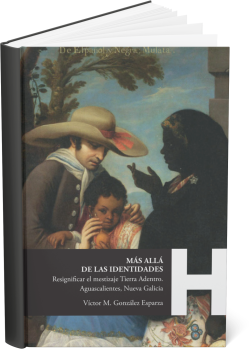BEYOND IDENTITIES: Resignifying the mestizaje Tierra Adentro. Aguascalientes, New Galicia
Keywords:
Mestizaje, Resignification, Aguascalientes, New Galicia, Tierra Adentro, Identities, Family, Demographics, XVII Century, XVIII Century, Illegitimacy, Marriage, Endogamy, Indigenous population, Afro-descendant population , Mortality crisis , Subsistence crisisSynopsis
This collection of essays published as an expanded reprint of the book Resignificar el mestizaje... (2018) is the product of a little more than ten years that the author has dedicated to the demographic history of the parish of Aguascalientes during the seventeenth and eighteenth centuries. Demographic and serial history provides information for analysis of changes over the long term, which allows questions and comparisons with other regions to be raised. González Esparza has used the aggregate method and not the nominal method because of the breadth of the records, so he did not reconstruct families; in exchange, the reader will find a long-term history to observe the main social changes that the records can offer us.
For this expanded reprint, a dozen essays on the seventeenth and eighteenth centuries have been recovered, some already published previously as can be seen in the appendix, which were elaborated thanks to the integration of a database of nearly 200 thousand parish records of Aguascalientes, including parish aids such as Asientos, Rincón de Romos and Calvillo, which allowed the author to work with one of the most complete databases of its kind at the national level.
In the last two generations of historians, regional history has been one of the main forms of work, especially in the universities of the states, which has provided abundant and detailed information, although it has not necessarily contributed to a greater understanding of historical phenomena. This paradox can be observed, for example, from the differences between regional history and microhistory, since the latter suggests global questions and local answers and not only the descriptive rescue of local sources. This essay also serves to show the perspective from which González Esparza has started to study a particular parish.
Demographic history in Mexico has had a late development and, therefore, incomplete, we know analyses of multiple towns, especially of "pueblos de indios" for the colonial period, but we know little about the Spanish and Afro-mestizo population, which has prevented us from knowing the population of New Spain as a whole and particularly the dynamics of mestizaje. This book is part of the recommendations offered by Cecilia Rabell to analyze more carefully the parish registers based on the different qualities, and by Chantal Cramaussel to analyze in particular the dynamics of mestizaje and of the Afro-descendant and indigenous population.
All of them are critical essays, which question the ideas in use, especially Euro and Anglocentric ideas that have predominated about the way in which our "identification process" is shaped. This process is particularly mentioned because, unlike fixed identities (hence the title of this book Beyond Identities), we have opted for an analysis of the social dynamics from the flexibility of a society that in one way or another, as Gruzinski pointed out, can be a reference from the mestizaje for the processes that are currently observed globally.
The purpose of devoting more than ten years to a history that questions the traditional views on the social conformation of Mexicans is to show, in the first place, that demographic history is a kind of structural scaffolding on which we can analyze social changes in all their complexity. On the other hand, the results we have found from the parish of Aguascalientes show us that the castes (or the Indo-Afromestizo population) played a central role in the dynamics of miscegenation, that illegitimacy was not as high as originally thought, that the age at marriage was not as low as it was supposed, in short, that these historical studies allow us to observe a new society that began to emerge from the seventeenth century and that is the origin of Mexican society.
In this sense, paraphrasing Lucien Febvre, it is hoped that these histories contribute to take off the weight of the past that weighs on our shoulders, and thus be able to face our present time with better arguments. Of course, there is still a long way to go before we have the data for each of the regions in this so-called colonial period, however, the advances in the new demographic history allow us to think differently about our past.

Downloads
Published
Series
Categories
License

This work is licensed under a Creative Commons Attribution-ShareAlike 4.0 International License.













